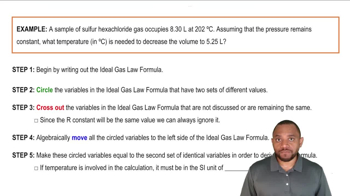The Ideal Gas Law Derivations definitions Flashcards
 Back
BackThe Ideal Gas Law Derivations definitions
1/10
Terms in this set (10)
- Ideal Gas LawA fundamental equation in chemistry, PV=nRT, used to predict the behavior of gases under various conditions.
- PressureThe force exerted by gas particles per unit area on the walls of its container.
- VolumeThe amount of space occupied by a gas, typically measured in liters or cubic meters.
- MolesA measure of the amount of substance, representing a specific number of particles, usually atoms or molecules.
- TemperatureA measure of the average kinetic energy of gas particles, affecting their speed and energy.
- DerivationThe process of rearranging equations to solve for unknown variables under different conditions.
- VariablesQuantities that can change or vary, such as pressure, volume, temperature, and moles in gas equations.
- EquationA mathematical statement that shows the equality of two expressions, used to describe gas behavior.
- ConditionsSpecific states or circumstances affecting gas behavior, such as temperature and pressure.
- PredictionsForecasts or estimations of gas behavior based on mathematical models and equations.


